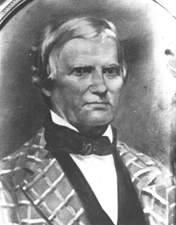Robert Hanna
| Robert Hanna | |
|---|---|
 |
|
|
U.S. Senator from Indiana |
|
|
In office August 19, 1831 – January 3, 1832 |
|
| Preceded by | James Noble |
| Succeeded by | John Tipton |
| Member of the Indiana House of Representatives | |
|
In office 1832–33; 1836–39 |
|
| Member of the Indiana Senate | |
|
In office 1840–41; 1842–46 |
|
| Personal details | |
| Born | April 6, 1786 South Carolina |
| Died | November 16, 1858 (aged 72) Indianapolis, Indiana |
| Political party | Democratic-Republican |
Robert Hanna Jr. (April 6, 1786 – November 16, 1858) is best known as one of the forty-three delegates to the 1816 Indiana Constitutional Convention and Indiana's third U.S. Senator after it achieved statehood in 1816. A native of Laurens District, South Carolina, he settled in the Indiana Territory shortly after it was established in 1800 and began his long career as a public servant in Brookville, Indiana. Hanna served as the first Franklin County sheriff (1809–20), as a brigadier general in the state militia, and as the U.S. Land Office registrar in Brookville and Indianapolis (1820–30). Hanna was appointed to fill the vacant seat in the U.S. Senate following the death of James Noble in 1831. Hanna served in the U.S. Senate from August 19, 1831, to January 3, 1832. After his return to Indianapolis, Hanna represented Marion County in the Indiana House of Representatives (1832–33; 1836–39) and in the Indiana Senate (1840–41; 1842–46).
Robert Hanna Jr. was born on April 6, 1786, near Fountainius in Laurens District, South Carolina. His father, Robert Hanna Sr., was born in Prince Edward County, Virginia. Immediately following Robert Sr.'s marriage to Mary Parks, the couple moved to South Carolina's Laurens District, where all nine of their children, including Robert Jr., were born.
...
Wikipedia
